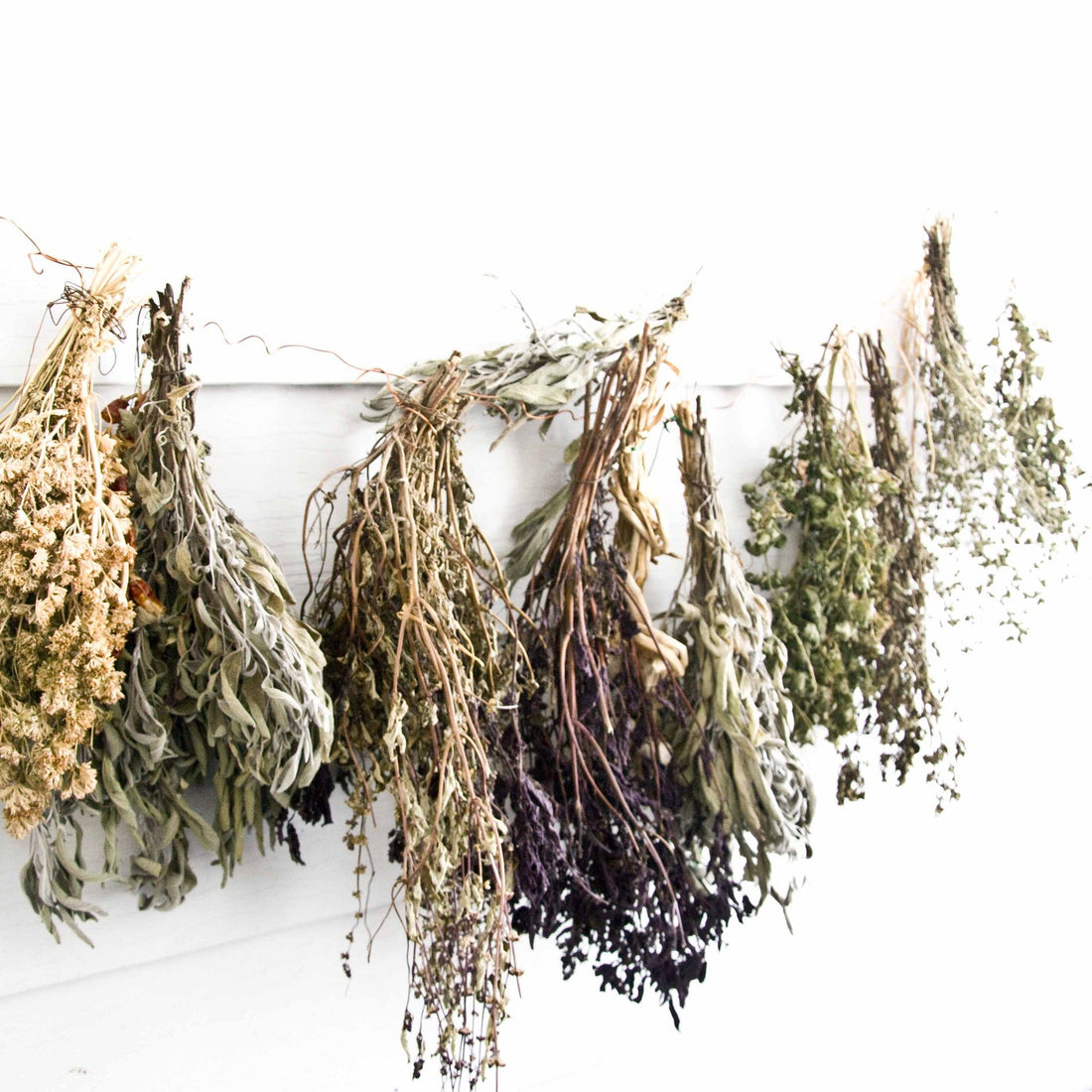Essential oils have recently been gaining the recognition they deserve, as ancient, tried and tested remedies for minor ailments.
Recently, there has been a trend to explore plant extracts to enhance conventional western medicine. Science-based research to find alternatives to combat new strains of antibiotics and viruses has led to more research into the world of plant-derived chemicals which has taken the humble herb to a whole new level.
While researching the ingredients of our soaps, I was extremely surprised to discover that the low maintenance, unassuming thyme plant, a hardy, low maintenance perennial, has more uses than as part of the herb ensemble in a bouquet garni - Thyme is a potential Oscar winner in the modern-day medical herbi-sphere. Unusually, thyme oil rarely features in the top 10 essential oil collection must-haves*. I think it should most definitely be in the top 5.

Some of the claimed benefits of thyme oil:
Antibacterial
Thymol, is the largest chemical ingredient in thyme oil and is said to have antimicrobial properties. One study found that thyme oil was effective in treating bacterial infections, especially staphylococcus strains and treatment-resistant strains like methicillin-resistant Staphylococcus Aureus (MRSA). Thyme essential oil has also been shown to be effective against bacterial strains Enterococcus and Escherichia. A Polish study tested thyme oil and lavender oil, and they that observed that thyme oil was effective against resistant strains of Staphylococcus, Enterococcus, Escherichia and Pseudomonas bacteria.
Immune system
Thyme oil is often used to boost the immune system and may help fight colds, flu, infectious diseases and chills. The high levels of vitamin C and vitamin A found in thyme make it a natural boost to the immune system. Vitamin C is the first line of defence in the body’s immune system and also plays a crucial part in the production of collagen, which is important for the repair of cells, muscles, tissues, and blood vessels. Thyme is also a good source of copper, fibre, iron, and manganese
Antioxidant
With one of the highest antioxidant concentrations in any herb, thyme has been used for thousands of years as an overall health tonic. The antioxidants found in thyme, include lutein, zeaxanthin, and thymonin, and these contribute to neutralising and eliminating free radicals in the body.
Acne and skin disorders
Thyme has produced promising results in anti-acne trials. The findings show that the Thyme tincture combats spots and acne better than existing chemical anti-acne treatments, most of which contain Benzoyl Peroxide. The antibacterial effect of Thyme proved to be better than standard concentrations of benzoyl peroxide without causing the skin irritation associated with Benzoyl Peroxide. Thyme oil may be effective in relieving symptoms of eczema and psoriasis.
Mood, concentration and stress
Thyme essential oil has been used for thousands of years to boost well being, because of its active substance carvacrol. Using thyme or thyme oil regularly might have a positive effect on your feelings and mood. Thyme oil is said to aid memory and concentration, can help with the feeling of exhaustion and combats depression. One of the vitamins in thyme (B6) has a significant effect on certain neurotransmitters in the brain, directly linked to stress hormones. Regular inclusion of thyme in your diet may help reduce stress and tension
Food preservative
It is reported that thyme oil, even at low concentrations, shows potential as a natural preservative of food products against several common foodborne bacteria.
Respiratory Infections and Coughs
The terpene in thymol may work as an anti-spasmodic to help reduce coughs and help with respiratory tract infections, bronchitis, colds, coughs, asthma, laryngitis, sinusitis, catarrh, whooping cough, sore throats and tonsillitis.
Rheumatism, sciatica, arthritis
The warming qualities of Thyme may help ease pain and discomfort caused by joint and muscle disorders.
Blood pressure
Thymus linearis Benth. is a species of thyme found in Pakistan and Afghanistan. Research is being carried out to see if an extract is able to significantly reduce heart rate, lower blood pressure (hypertension) and lower cholesterol. So far, the findings have been positive.
The concentration of carotenoids and vitamin A found in thyme may make it an effective antioxidant for eye health. Carotenoids can neutralize the free radicals in the ocular system may help slow the onset of macular degeneration and prevent cataracts.
Yeast Infections
Thyme essential oil may have anti-fungal properties and so it used to treat topical fungal disorders.
Insect and pest repellent
Thyme oil has been found to be quite an effective mosquito repellent and is an ingredient in many pesticides.
 Where it grows: Thyme can be grown at home in the garden or on a sunny windowsill. In the wild, thyme is native to the Mediterranean and grows well in sunny warm climates with well-drained soil, such as Provence in the South of France, Greece and Malta. Wild Thyme can also survive freezing temperatures and can be found on sunny well drained chalky or rocky soil in England, or even in the chillier highlands of Scotland. Today, the main countries producing thyme essential oil, are France, Spain, Morocco and USA.Thyme genus [Thymus] is a member of the Mint Family and is related to Oregano
Where it grows: Thyme can be grown at home in the garden or on a sunny windowsill. In the wild, thyme is native to the Mediterranean and grows well in sunny warm climates with well-drained soil, such as Provence in the South of France, Greece and Malta. Wild Thyme can also survive freezing temperatures and can be found on sunny well drained chalky or rocky soil in England, or even in the chillier highlands of Scotland. Today, the main countries producing thyme essential oil, are France, Spain, Morocco and USA.Thyme genus [Thymus] is a member of the Mint Family and is related to Oregano
The plant: Thyme is a perennial evergreen aromatic herb with pretty lilac flowers which bloom in the summer months. If grown at home, it doesn’t like a lot of fuss and grows better if left alone. There are about 400 species of Thyme but the most common is Thymus Vulgaris – whose leaves and flowers are used for essential oils.
Chemical composition of Thyme essential oil: Essential oils are made up of chemicals called terpenes, which give a plant it’s flavour and fragrance. Oil of Thyme contains: carvacrol, thymol, linalool, cineol, camphor, and borneol. Thyme’s essential oil, contains between 20 percent and 60 percent tymol.
How is the oil extracted?
Tincture: When thyme leaves or flowers are steeped in alcohol for days or weeks, it turns into a solution known as a tincture which can be used in medicine
Essential oil: oils are extracted from the thyme plant via distillation or cold-pressing.

Greeks: The name Thyme is derived from the Greek word 'thymos' which means 'perfume'. Hippocrates, who lived around 460 BCE to 370 BCE and is known today as “the father of Western medicine,” recommended thyme for respiratory diseases and conditions. People grew thyme in gardens and gathered it in the countryside. The ancient Greeks used Thyme in their baths and burnt it as incense in their temples, believing it was a source of courage.
Ancient Egyptians used thyme for embalming
Romans The great Roman writer Pliny (c23-79 AD) who was an authority on all things scientific in Europe wrote, ‘when burnt, it puts to flight all venomous creatures’. He also recommended it as a treatment for epilepsy. The spread of thyme throughout Europe was thought to be due to the Romans, as they used it to purify their rooms and to "give an aromatic flavour to cheese and liqueurs". They are also supposedly offered it as a cure people for who were melancholic or shy. The Roman army introduced thyme to the British Isles when they conquered the land.
Britain in the Middle Ages, thyme was used throughout Europe to help fight the Black Plague. It was placed beneath pillows to help sleep and ward off nightmares. Women often gave Warriors gifts that included thyme leaves, as it was believed to bring courage to the bearer. Ladies commonly embroidered an emblem of a bee hovering over a sprig of thyme on scarves they would give to their knights. The thyme on this emblem symbolised activity, bravery and energy. During this period, thyme was used as incense and placed on coffins during funerals, as it was supposed to assure passage into the next life.
Scottish highlanders drank a tea made of wild thyme to gain courage before battle and to also ward off nightmares.
When the Black Death took hold of Europe in the 1340s, people would wear posies of thyme for protection.
During the First World War, thyme essential oil was used in hospitals to sanitize the wards and operating theatres, and it is still used in the pharmaceutical industry for the manufacture of cough medicines, mouthwashes and toothpaste. Clinical trials have shown that thyme oil is highly effective against MRSA (Methicillin-resistant Staphylococcus aureus).

Warnings and disclaimers:
This blog is for general interest only and does not replace official information and manufacturers guidelines and the proper use of essential oils must always be followed.
Some essential oils can cause skin irritation when applied to the skin and can also cause serious damage to organs.
Always use the correct amount blended well with a carrier oil, like coconut oil, before application and it is absolutely essential to follow instructions.
Unlike the fresh leaves, a person cannot consume essential oils by mouth or apply it directly to the skin.
Essential oils are very potent and should not be used during pregnancy or in cases of high blood pressure.
Sources
https://essentialoils.co.za/essential-oils/thyme.htm
https://en.wikipedia.org/wiki/Thyme
https://www.prohealth.com/library/20-health-benefits-of-thyme-oil-36291
https://www.quinessence.com/blog/thyme-essential-oil
https://www.wildlifetrusts.org/wildlife-explorer/wildflowers/wild-thyme
https://www.organicfacts.net/health-benefits/herbs-and-spices/thyme.html
* (top ten essential oils as cited by https://www.wellandgood.com/good-looks/10-best-essential-oils/)


